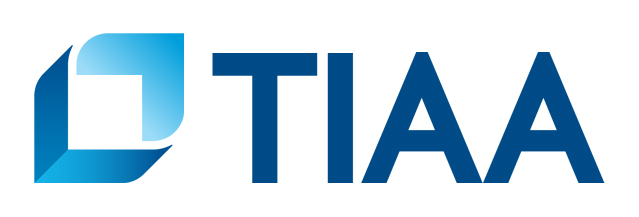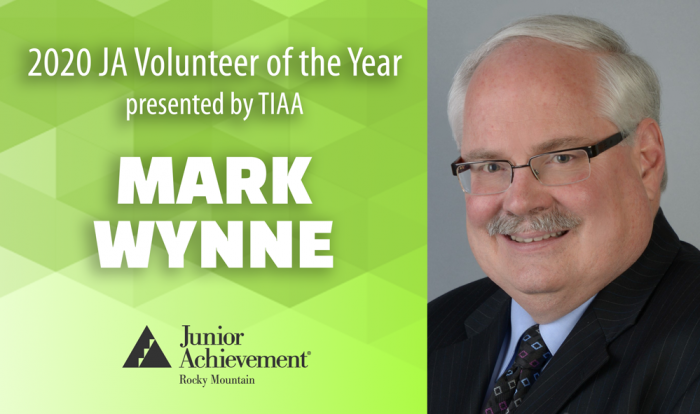
JA-Rocky Mountain’s 2020 Volunteer Appreciation Week is presented by TIAA.

Junior Achievement-Rocky Mountain is proud to name Mark Wynne as its 2020 Volunteer of the Year, presented by TIAA. Since 2018, Mark has volunteered 83 times in nearly all of JA-Rocky Mountain’s programs, and has regularly volunteered with JA in other cities.
His knack for storytelling and relating JA’s career and financial concepts to students and their educational journeys have made Mark a popular face in classrooms and JA Finance Park, presented by Transamerica.
“The students love hearing stories about your work, no matter if you are just starting off, or just went through college, they are hungry for outside stories,” he says.
He has a few tricks up his sleeve to get ever-distracted students to perk up and pay attention too.
“I always mention I was born and raised in Kansas City, so I’m a Kansas City Chiefs fan, and then I wait for their groans,” he laughs. “Except this year, since they were Super Bowl champs, all of a sudden there are Chiefs fans here in Denver now!”
He also likes to start off his JA Take Stock in Your Future classes (the in-classroom lesson that prepares students for the JA Stock Market Challenge) showing off a relic from the past.
“One of the things I do is pass around a 95-year old stock certificate. They can’t believe it! That perks them up when they look at that.”

Now retired, Mark spent his career as an accountant for wet milling companies, primarily corn, in Kansas City, Cedar Rapids, Chicago, and Denver. Growing up, Mark knew he excelled in math and was detail oriented. His older brother was already an accountant, so Mark was excited to discover accounting and bookkeeping classes were available at the vocational technology school across the street from his high school, where he spent most of his senior year. From there, a combination of schooling, including obtaining his MBA at nighttime while working full time during the day, is what drew him to teaching. It was in Cedar Rapids where he first volunteered for JA through his three kids’ schools.
“I would make a point every year to teach in one of my children’s classrooms. It gave me a chance to see what the teacher’s kind of like, what the school is kind of like, and also to share my work experiences with the children in their classrooms.”
Over the years, Mark has collected and saved hundreds of thank you notes he received from his JA students. All of them are treasured memories for him, but it’s the kids that say the darndest things he’ll never forget.
“One of them was so funny. The class was talking about imports and exports. We designed a product and I told them, you’ve got to figure out how we’re going to get it to a different country, and then we’re going to talk about why would you do that. One student said ‘it was fun designing a product. We shipped Playstation2 from Maine to Sweden by boat. We thought Sweden needs more excitement,’” he laughs. “I still have that note!”
Mark was volunteering immediately prior to local quarantine mandates, leading a JA Take Stock in Your Future lesson just as the market began significantly declining at levels unheard of to teens who were toddlers during the last market crash, and have grown up seeing only market growth.
“When I talked about bull and bear markets, they didn’t even know what I was talking about when I said bear market. Well now they do. But JA teaches them about knowing your risk levels and comfort,” he says.
“I think financial literacy is a fundamental skill. Anytime JA can get into schools and introduce these skills, make it fun, and help them practice it a little bit, it will make our students more positive for the future. They are getting their formal education, they’re learning their skills, abilities, and aptitudes. But we need to pull it all together to help them plan for the future, so they can be financially independent.”

